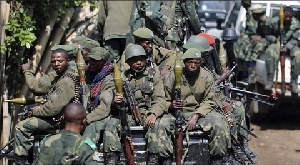 Pregnant women are stopped on the roads, they are raped with impunity
Pregnant women are stopped on the roads, they are raped with impunity
Former rebels who once commanded armed political groups in the blood-stained Ituri province in the Democratic Republic of Congo, and were recently released from prison in January are part of an army-escorted peace envoy to the same region sent by President Felix Tshisekedi.
They are assigned the challenge of negotiating with the Cooperation for the Development of Congo (CODECO), a political-military sect - blamed for the massacre of hundreds of civilians in the province.
Most of the victims have been herders and traders from their traditional rivals, the Hema, according to a United Nations (UN) report that says a possible "crime against humanity" has been committed.
Floribert Ndjabu, once president of the Nationalist and Integrationist Front (FNI) that was active in the First Ituri War between the Hema and Lendu in 1999-2003, and Germain Katanga previously in command of the armed group Patriotic Resistance Force of Ituri (FRPI), are among half a dozen former rebels sent on the peace mission in the region where they themselves once wreaked havoc.
Germain Katanga, now general of the armed forces of the Democratic Republic of the Congo, shared a few details about the ongoing negotiations, "It was a long discussion but in the end, it was agreed that, from one moment to the next, as soon as the head of state responds to their terms of reference or their integration into the army or the police or community reintegration, everything will be fine."
Integrating rebels into the army is not an uncommon strategy in many African nations but is one condemned by the UN’s local representative, Leïla Zerrougui, who believes no war crime should go unpunished out of respect for the perpetrators’ victims.
Ngadjole Ngabu, a religious leader of the CODECO militia, expressed his stance on the matter, "We are fighting because of the violence of the FaRDC. Pregnant women are stopped on the roads, they are raped with impunity and the government says nothing."
The regional violence has taken over 1,000 lives since December 2017, according to the UN while the International Crisis Group (ICG) states half a million people have fled their homes.